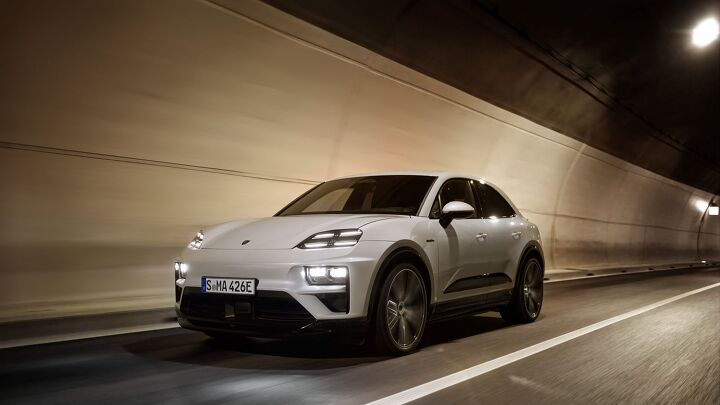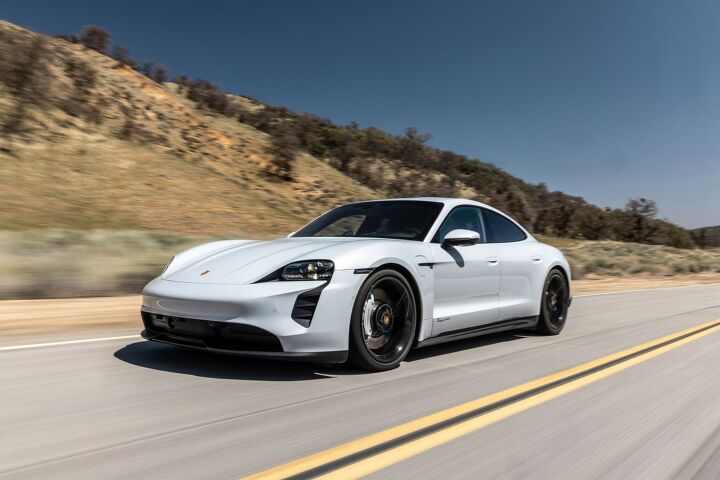Porsche Now Considering Gasoline Variants of EVs


Having already pivoted its highest-volume model to run on all-electric power, Porsche is now considering building internal combustion variants of EVs. We appear to have come full circle on electrification in roughly the same time frame the industry previously assumed they’d become the dominant mode of transportation.
Aggressive regulatory mandates in Europe and increasingly stringent emission requirements have encouraged the brand to end sales of the combustion Macan and 718 on home market early. But it was previously committed to pivoting toward EVs as part of its current corporate ethos. Porsche already builds an all-electric version of the Macan and the brand has the Taycan EV — not to mention a slew of hybridized models — with an electrified version of the 718 soon to follow.
However, the business has noticed that plug-in vehicles aren’t seeing the same kind of demand as vehicles that continue to rely on gasoline. This came up during the Q3 call for investors, with leadership hinting that one future strategy could be to build combustion variants of electric models.
“A lot of customers in the premium and luxury segment are looking in the direction of combustion-engined cars, there’s a clear trend,” Porsche CFO Lutz Meschke was quoted by CarBuzz as saying during the conference call.


“When it comes to research and development, you’ll see more flexibility in the upcoming years. We will develop new combustion-engined derivatives of electrified cars in order to give the right answer to customer demand.”
While that’s probably a wise decision in regard to sales, one wonders how well this strategy will play out. Numerous manufacturers, including Porsche parent Volkswagen Group, have been adamant that their end goal was to pivot entirely toward all-electric lineups. In 2023, Porsche expected electric vehicles to make up 80 percent of sales by 2030. But the brand doesn’t appear to be on a trajectory for that to happen.
The big concern here is that these new models won’t be particularly good combustion vehicles if they were originally designed to be electric. Purpose-built EVs need to be able to package all-electric drive motors and massive batteries beneath the floorboards, whereas combustion cars need to accommodate space for engines, transmissions, and driveshafts. Unless Porsche plans on trying to build a lot of plug-in hybrids, which are even less popular than pure battery electric vehicles right now, it’s hard to imagine how it’ll pull this off.
For what it’s worth, Meschke said that the company’s future platforms would be extremely flexible in terms of their production footprint. Porsche is allegedly equipped to swap between all-electric, combustion, and plug-in hybrid vehicles on the same production lines in Leipzig. But Porsche is a performance brand fixated on concepts like balance and weight distribution. Trying to adapt pre-existing EVs into becoming combustion vehicles would be difficult without fundamentally changing how they drive.
The second-generation Macan launched earlier this year and is exclusively electric, using the new Premium Platform Electric (PPE) platform. Gasoline versions of the crossover are technically riding on an updated version of the older architecture. But the new PPE platform is supposed to have a related Premium Platform Combustion (PPC) architecture which likewise leverages a lot of tech from the older MLB cars. Since the two new platforms share a lot of the old MLB underpinnings and are alleged to be similar themselves, future PPC models may be able to share factory space with PPE vehicles.
But it seems impossible that the resulting EV and combustion cars wearing the same badging and bodywork would feel the same from behind the wheel. They’d just be too mechanically dissimilar, with weight distribution being unique to their respective powertrains. While that’s the fault of physics, not the manufacturer, one wonders why even bother trying to put both under a single model name.
Part of this feels like lip service on the part of the company. EVs have been polarizing and automakers have indicated that they don’t want to snub enthusiasts who prefer combustion vehicles. The brand is still supposed to be committed to transitioning toward all-electric vehicles, with the rest of VW Group following suit. But the sales just aren’t there yet and they’ve already committed themselves toward electrification.
Porsche may have considered all of this well in advance, with its new platforms up to the task of fielding quality electric and combustion vehicles. However, the above statements do represent a slight change in the way the company has been talking about EVs of late — perhaps suggesting that it has been caught off guard by consumers wanting to stick with combustion vehicles.
[Images: Porsche]
Become a TTAC insider. Get the latest news, features, TTAC takes, and everything else that gets to the truth about cars first by subscribing to our newsletter.
Source: The Truth About Cars
Recent Posts
Linda Cardellini Will Be Jason’s Murderous Mom in the Friday the 13th TV Show
She's the first big name to board the long-delayed slasher prequel show Crystal Lake.
watchOS 11.4 gives your Apple Watch an alarm feature it’s long been missing
The next Apple Watch software update is on its way. watchOS 11.4 just debuted its…
Webb Spots ‘Cosmic Tornado’ in Stunning Detail
The Webb Space Telescope captured a chance alignment of a protostellar outflow and a spiral…
Duckett says England losses in ODI and Champions Trophy ‘hurt me so much’
Opener insists results matter despite comments in IndiaDuckett clarifies social media posts on Jasprit BumrahBen…
MagSafe Monday: In a sea of lookalike batteries, SHARGE stands out with a see-through design
If you’ve ever looked, you’ll notice that most MagSafe batteries look the same. The same…